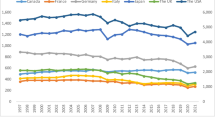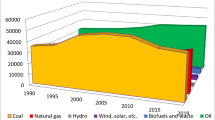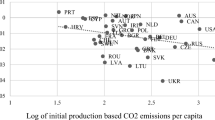Abstract
Over the last few decades, economic policy uncertainty (EPU) has surged across the globe. Furthermore, EPU affects economic activities, which may also generate strong CO2 emissions. The goal of this study is to explore the impact of EPU (measured by the world uncertainty index) on CO2 emissions in the case of the top ten carbon emitter countries, spanning the period 1990 to 2015. The findings from the PMG-ARDL modelling approach document that the world uncertainty index (WUI) affects CO2 emissions in both the short and the long run. In the short run, a 1% increase in WUI mitigates CO2 emissions by 0.11%, while a 1% rise in WUI escalates CO2 emissions by 0.12% in the long run. The findings could have some substantial practical effects on economic policies through which policy makers try to shrink any uncertainty by organizing and participating in international summits and treaties. In addition, international organizations could also launch certain programs to shrink uncertainties associated with economic policy. Finally, these countries should introduce innovation, renewable energy, and enforce alternative technologies that are environment friendly. Overall, governments must provide strong tax exemptions on the use of clean energy, while R&D budgets should also expand.










Similar content being viewed by others
Data availability
Data will be available upon request.
References
Adams S, Klobodu EKM, Apio A (2018) Renewable and non-renewable energy, regime type and economic growth. Renew Energy 125:755–767
Adams S, Adedoyin F, Olaniran E, Bekun FV (2020) Energy consumption, economic policy uncertainty and carbon emissions; causality evidence from resource rich economies. Econ Anal Pol 68:179–190
Adedoyin FF, Bekun FV (2020) Modelling the interaction between tourism, energy consumption, pollutant emissions and urbanization: renewed evidence from panel VAR. Environ Sci Pollut Res 27(31):38881–38900
Adedoyin FF, Zakari A (2020) Energy consumption, economic expansion, and CO2 emission in the UK: the role of economic policy uncertainty. Sci Total Environ 738:140014
Ahir H, Bloom N, Furceri D (2019) The world uncertainty index. Stanford mimeo
Akadiri SS, Alola AA, Uzuner G (2020) Economic policy uncertainty and tourism: evidence from the heterogeneous panel. Curr Issues Tourism 23(20):2507–2514
Alam MS, Apergis N, Paramati SR, Fang J (2020) The impacts of R&D investment and stock markets on clean-energy consumption and CO2 emissions in OECD economies. Int J Fin Econ 2020:1–14
Ali AM (2001) Political instability, policy uncertainty, and economic growth: an empirical investigation. Atl Econ J 29(1):87–106
Ali S, Dogan E, Chen F (2020) Khan Z (2020) International trade and environmental performance in top ten-emitters countries: the role of eco-innovation and renewable energy consumption. Sustain Dev 2020(1):2–28
Alola AA, Yalçiner K, Alola UV, Saint Akadiri S (2019) The role of renewable energy, immigration and real income in environmental sustainability target. Evidence from Europe largest states. Science of The Total Environment 674:307–315
Alola AA, Arikewuyo AO, Ozad B, Alola UV, Arikewuyo HO (2020) A drain or drench on biocapacity? Environmental account of fertility, marriage, and ICT in the USA and Canada. Environ Sci Pollut Res 27(4):4032–4043
Amin A, Dogan E, Khan Z (2020) The impacts of different proxies for financialization on carbon emissions in top-ten emitter countries. Sci Total Environ 740:140127–140127
Apergis N, Ozturk I (2015) Testing environmental Kuznets curve hypothesis in Asian countries. Ecol Indic 52:16–22
Apergis N, Payne JE (2010) The emissions, energy consumption, and growth nexus: evidence from the commonwealth of independent states. Energy Policy 38(1):650–655
Arouri M, Estay C, Rault C, Roubaud D (2016) Economic policy uncertainty and stock markets: long-run evidence from the US. Financ Res Lett 18:136–141
Aslan A, Destek MA, Okumus I (2018) Bootstrap rolling window estimation approach to analysis of the Environment Kuznets Curve hypothesis: evidence from the USA. Environ Sci Pollut Res 25(3):2402–2408
Baker SR, Bloom N, Davis SJ (2016) Measuring economic policy uncertainty. Q J Econ 131(4):1593–1636
Baloch MA, Mahmood N, Zhang JW (2019) Effect of natural resources, renewable energy and economic development on CO2 emissions in BRICS countries. Sci Total Environ 678:632–638
Begum RA, Sohag K, Abdullah SMS, Jaafar M (2015) CO2 emissions, energy consumption, economic and population growth in Malaysia. Renew Sust Energ Rev 41:594–601
Bekun FV, Alola AA, Sarkodie SA (2019) Toward a sustainable environment: Nexus between CO2 emissions, resource rent, renewable and nonrenewable energy in 16-EU countries. Sci Total Environ 657:1023–1029
Canh NP, Binh NT, Thanh SD, Schinckus C (2020) Determinants of foreign direct investment inflows: the role of economic policy uncertainty. Int Econ 161:159–172
Danish, Baloch MA, Mahmood N, Zhang JW (2019) Effect of natural resources, renewable energy and economic development on CO2 emissions in BRICS countries. Sci Total Environ 678:632–638
Danish Ulucak R, Khan SUD (2020) Relationship between energy intensity and CO2 emissions: does economic policy matter? Sustain Dev 28(5):1457–1464
Destek MA (2020) Investigation on the role of economic, social, and political globalization on environment: evidence from CEECs. Environ Sci Pollut Res 27(27):33601–33614
Dietz T, Rosa EA (1994) Rethinking the environmental impacts of population, affluence and technology. Hum Ecol Rev 1(2):277–300
Dogan E, Ozturk I (2017) The influence of renewable and non-renewable energy consumption and real income on CO 2 emissions in the USA: evidence from structural break tests. Environ Sci Pollut Res 24(11):10846–10854
Dogan E, Seker F (2016) The influence of real output, renewable and non-renewable energy, trade and financial development on carbon emissions in the top renewable energy countries. Renew Sust Energ Rev 60:1074–1085
Dogan E, Ulucak R, Kocak E, Isik C (2020) The use of ecological footprint in estimating the environmental Kuznets curve hypothesis for BRICST by considering cross-section dependence and heterogeneity. Sci Total Environ 723:138063
Ehrlich PR, Holdren JP (1971) Impact of population growth. ObstetGynecolSurv 26(11):769–771
Ertugrul HM, Cetin M, Seker F, Dogan E (2016) The impact of trade openness on global carbon dioxide emissions: evidence from the top ten emitters among developing countries. Ecol Indic 67:543–555
Farhani S, Ozturk I (2015) Causal relationship between CO 2 emissions, real GDP, energy consumption, financial development, trade openness, and urbanization in Tunisia. Environ Sci Pollut Res 22(20):15663–15676
Farhani S, Shahbaz M, Sbia R, Chaibi A (2014) What does MENA region initially need: grow output or mitigate CO2 emissions? Econ Model 38:270–281
Fatima T, Shahzad U, Cui L (2020) Renewable and nonrenewable energy consumption, trade and CO2 emissions in high emitter countries: does the income level matter? J Environ Plann Manag 2020:1–25. https://doi.org/10.1080/09640568.2020.1816532
Hashmi R, Alam K (2019) Dynamic relationship among environmental regulation, innovation, CO2 emissions, population, and economic growth in OECD countries: a panel investigation. J Clean Prod 231:1100–1109
Hausman JA (1978) Specification tests in econometrics. Econometrica 46(6):1251–1271
Jiang Y, Zhou Z, Liu C (2019) Does economic policy uncertainty matter for carbon emission? Evidence from US sector level data. Environ Sci Pollut Res 26(24):24380–24394
Joshua U, Bekun FV (2020) The path to achieving environmental sustainability in South Africa: the role of coal consumption, economic expansion, pollutant emission, and total natural resources rent. Environ Sci Pollut Res 27(9):9435–9443
Kang W, Ratti RA (2013) Structural oil price shocks and policy uncertainty. Econ Model 35:314–319
Kang W, Lee K, Ratti RA (2014) Economic policy uncertainty and firm-level investment. J Macroecon 39:42–53
Levin A, Lin CF, Chu CSJ (2002) Unit root tests in panel data: asymptotic and finite-sample properties. J Econ 108(1):1–24
Li R, Jiang R (2020) Does increase in R & D investment reduce environmental pressures? Empirical research on the global top six carbon emitters. Sci Total Environ 740:140053
Mohmmed A, Li Z, Arowolo AO, Su H, Deng X, Najmuddin O, Zhang Y (2019) Driving factors of CO2 emissions and nexus with economic growth, development and human health in the top ten emitting countries. Resour Conserv Recycl 148:157–169
Mohsin M, Abbas Q, Zhang J, Ikram M, Iqbal N (2019) Integrated effect of energy consumption, economic development, and population growth on CO 2 based environmental degradation: a case of transport sector. Environ Sci Pollut Res 26(32):32824–32835
Murshed M, Nurmakhanova M, Elheddad M et al (2020) Value addition in the services sector and its heterogeneous impacts on CO2 emissions: revisiting the EKC hypothesis for the OPEC using panel spatial estimation techniques. Environ Sci Pollut Res 27:38951–38973. https://doi.org/10.1007/s11356-020-09593-4
Narayan PK, Narayan S (2010) Carbon dioxide emissions and economic growth: panel data evidence from developing countries. Energy Policy 38(1):661–666
Nejat P, Jomehzadeh F, Taheri MM, Gohari M, Majid MZA (2015) A global review of energy consumption, CO2 emissions and policy in the residential sector (with an overview of the top ten CO2 emitting countries). Renew Sust Energ Rev 43:843–862
Omri A, Nguyen DK, Rault C (2014) Causal interactions between CO2 emissions, FDI, and economic growth: evidence from dynamic simultaneous-equation models. Econ Model 42:382–389
Pesaran MH (2007) A simple panel unit root test in the presence of cross-section dependence. J Appl Econ 22(2):265–312
Pesaran MH, Smith R (1995) Estimating long-run relationships from dynamic heterogeneous panels. J Econ 68(1):79–113
Pesaran MH, Shin Y, Smith RP (1999) Pooled mean group estimation of dynamic heterogeneous panels. J Am Stat Assoc 94(446):621–634
Pirgaip B, Dinçergök B (2020) Economic policy uncertainty, energy consumption and carbon emissions in G7 countries: evidence from a panel Granger causality analysis. Environ Sci Pollut Res Int 27:30050–30066
Rehman M, Apergis N (2019) Sensitivity of economic policy uncertainty to investor sentiment: evidence from Asian, developed and European markets. Stud Econ Fin 36(2):114–129
Sadorsky P (2009) Renewable energy consumption, CO2 emissions and oil prices in the G7 countries. Energy Econ 31(3):456–462
Sadorsky P (2014) The effect of urbanization on CO2 emissions in emerging economies. Energy Econ 41:147–153
Sahinoz S, Erdogan Cosar E (2018) Economic policy uncertainty and economic activity in Turkey. Appl Econ Lett 25(21):1517–1520
Salahuddin M, Alam K, Ozturk I, Sohag K (2018) The effects of electricity consumption, economic growth, financial development and foreign direct investment on CO2 emissions in Kuwait. Renew Sust Energ Rev 81:2002–2010
Shahbaz M, Hye QMA, Tiwari AK, Leitão NC (2013) Economic growth, energy consumption, financial development, international trade and CO2 emissions in Indonesia. Renew Sust Energ Rev 25:109–121
Shahbaz M, Khan S, Ali A, Bhattacharya M (2017) The impact of globalization on CO2 emissions in China. Singapore Econ Rev 62(04):929–957
Sun X, Chen X, Wang J, Li J (2020) Multi-scale interactions between economic policy uncertainty and oil prices in time-frequency domains. North Am J Econ Fin 51:100854
Tam PS (2018) Global trade flows and economic policy uncertainty. Appl Econ 50(34-35):3718–3734
Ullah S, Ozturk I, Sohail S (2020a) The asymmetric effects of fiscal and monetary policy instruments on Pakistan’s environmental pollution. Environ Sci Pollut Res. https://doi.org/10.1007/s11356-020-11093-4
Ullah S, Chishti MZ, Majeed MT (2020b) The asymmetric effects of oil price changes on environmental pollution: evidence from the top ten carbon emitters. Environ Sci Pollut Res 27:29623–29635
Wang Q, Xiao K, Lu Z (2020) Does economic policy uncertainty affect CO2 emissions? Empirical evidence from the United States. Sustainability 12(21):9108
Westerlund J (2007) Testing for error correction in panel data. Oxf Bull Econ Stat 69(6):709–748. https://doi.org/10.1111/j.14680084.2007.00477.x
Xu Z (2020) Economic policy uncertainty, cost of capital, and corporate innovation. J Bank Financ 111:105698
York R, Rosa EA, Dietz T (2003) STIRPAT, IPAT and IMPACT: analytic tools for unpacking the driving forces of environmental impacts. Ecol Econ 46(3):351–365
Zaidi SAH, Hou F, Mirza FM (2018) The role of renewable and non-renewable energy consumption in CO 2 emissions: a disaggregate analysis of Pakistan. Environ Sci Pollut Res 25(31):31616–31629
Zhang C, Lin Y (2012) Panel estimation for urbanization, energy consumption and CO2 emissions: a regional analysis in China. Energy Policy 49:488–498
Author information
Authors and Affiliations
Contributions
M.K. Anser: Conceptualization and data analysis
Q.R.Syed: Drafting
N. Apergis: Supervision
Corresponding author
Ethics declarations
Ethics approval
Not applicable.
Consent to participate
Not applicable.
Consent for publication
Not applicable.
Competing interests
The authors declare no competing interests.
Additional information
Responsible Editor: Philippe Garrigues
Publisher’s note
Springer Nature remains neutral with regard to jurisdictional claims in published maps and institutional affiliations.
Rights and permissions
About this article
Cite this article
Anser, M.K., Apergis, N. & Syed, Q.R. Impact of economic policy uncertainty on CO2 emissions: evidence from top ten carbon emitter countries. Environ Sci Pollut Res 28, 29369–29378 (2021). https://doi.org/10.1007/s11356-021-12782-4
Received:
Accepted:
Published:
Issue Date:
DOI: https://doi.org/10.1007/s11356-021-12782-4
Keywords
- Economic policy uncertainty
- World uncertainty index
- CO2 emissions
- Environmental Kuznets curve
- Top ten emitters




